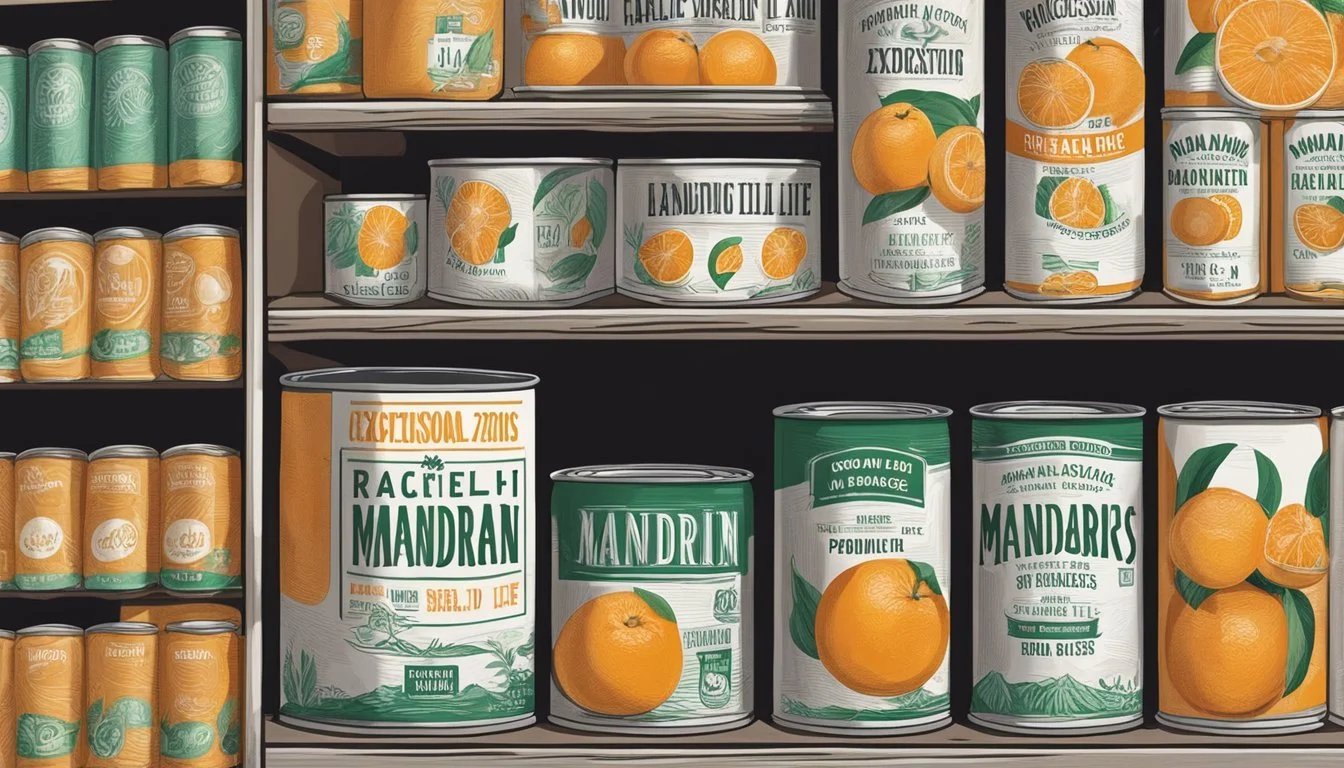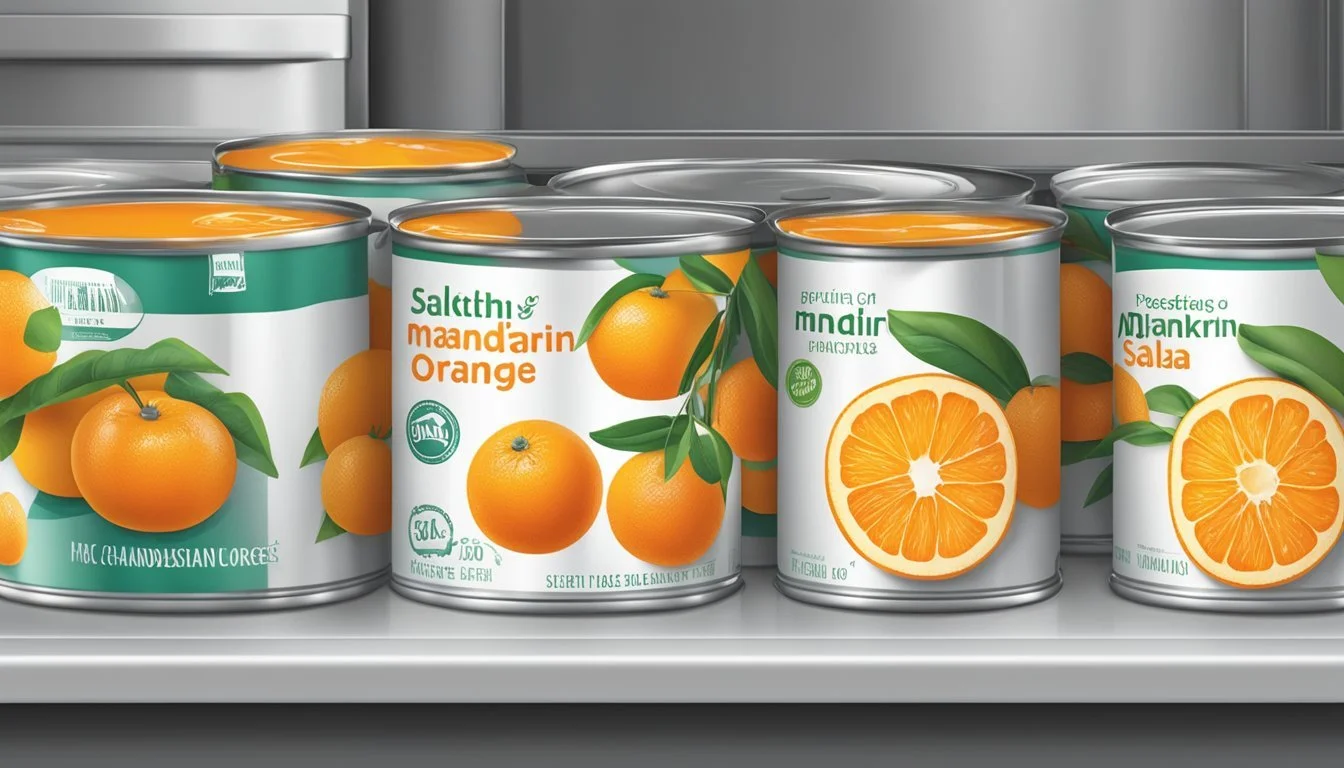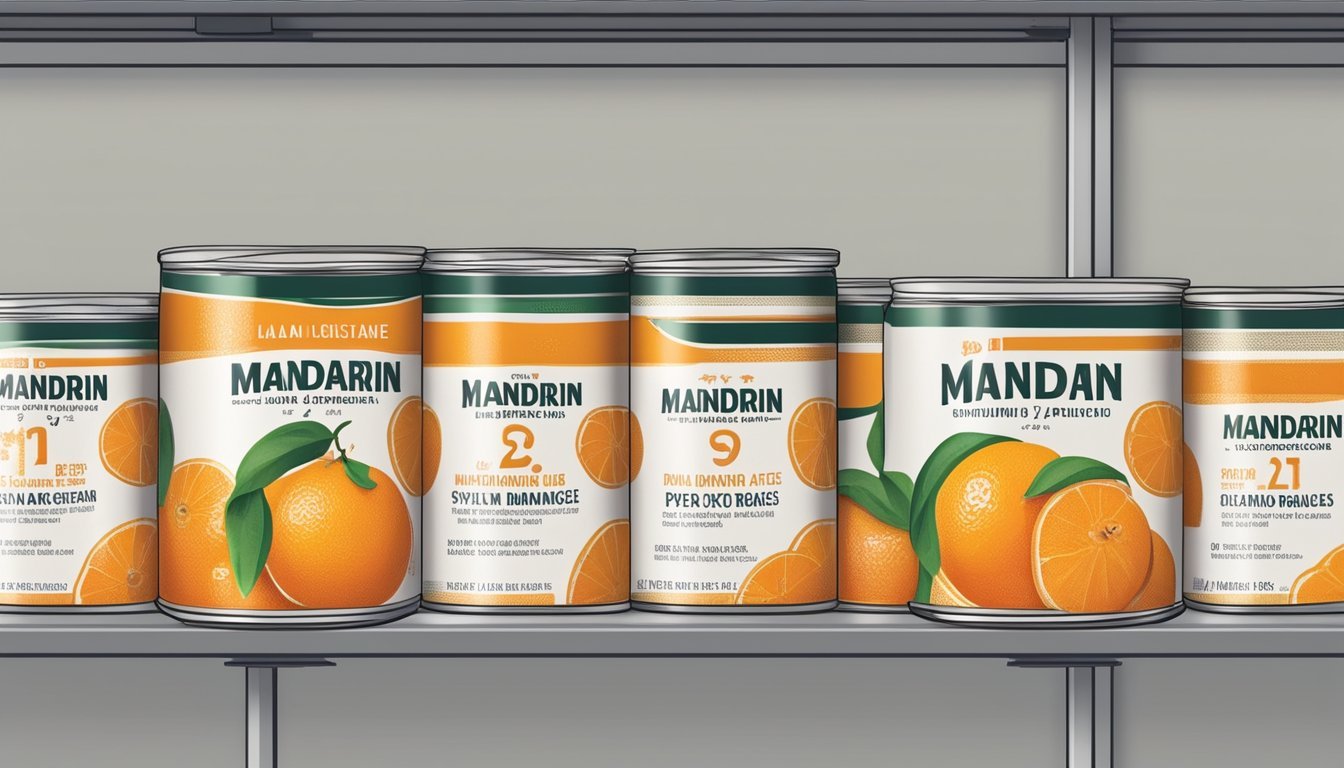How Long Do Canned Mandarin Oranges Last?
Shelf Life & Storage Tips
Canned mandarin oranges are a popular pantry staple, prized for their convenience, sweetness, and durability. The shelf life of canned mandarin oranges is a product of both the canning process and the syrups or juices used for preservation. When unopened and stored in a cool, dry place, these cans maintain their best quality typically for 18 to 24 months. Although they often remain safe to consume beyond this period, their texture, taste, and nutritional value can degrade over time.
Once opened, the preservation of mandarin oranges changes significantly. Exposure to air and moisture can affect their quality. They are best consumed within a short time frame after opening, usually between 3 to 5 days when stored in the refrigerator. The syrup or juice within the can acts as a natural preservative, but it's crucial that the fruit remains submerged in this liquid to prevent spoilage and maintain quality during refrigeration.
Consumers should always inspect canned mandarin oranges before use, regardless of the storage duration. Indicators such as rust, denting, or bulging of the can may signify a compromised product and potential food safety risks. Moreover, any off-odors, altered colors, or textures once the can is opened can also indicate that the mandarin oranges are no longer suitable for consumption. By adhering to these guidelines, consumers can enjoy canned mandarin oranges safely and at their best quality.
Understanding Canned Mandarin Oranges
In the realm of canned fruits, mandarin oranges occupy a distinct niche, offering a blend of nutritional benefits and convenience. They are preserved in a can with syrup or juice and are known for their sweetness and rich vitamin content.
What Are Canned Mandarin Oranges
Canned mandarin oranges are small, sweet citrus fruits that have been peeled, segmented, and preserved in a canning process. The canning involves sealing the mandarins in a container, typically with a sweet syrup or fruit juice, and then heating them to eliminate bacteria and enzymes that could lead to spoilage. This method effectively extends the shelf life of the fruit while maintaining its taste and nutritional value. The ingredients usually include:
Mandarin orange segments
Water or juice
Sugar or high fructose corn syrup (optional)
Ascorbic acid (to maintain color)
Nutritional Benefits
Canned mandarin oranges are not only convenient but also packed with important nutrients. They provide vitamin C, essential for skin health and immune function, and vitamin A, which supports eye health. Here are some of the nutritional benefits they offer per serving (about 1 cup):
Vitamin C: Approx. 30% of the Recommended Dietary Allowance (RDA)
Vitamin A: Approx. 15% of RDA
Fiber: Around 2 grams, aiding in digestive health
Potassium: An important mineral for heart function
Also, while they contain a low level of protein, mandarin oranges fit well into a healthy diet providing essential nutrients with relatively few calories. Despite the additional sugars in syrup, when consumed in moderation, canned mandarin oranges can be part of a balanced diet, especially when fresh fruits are out of season or unavailable.
Canning Process and Preservation
The preservation of mandarin oranges through canning is a method that relies on sterilization and sealing techniques to prolong shelf life. This process, whether conducted at home or through commercial means, is governed by specific standards to ensure safety and quality.
Canning Mandarin Oranges at Home
Home canning of mandarin oranges utilizes a water bath canning method. The process involves peeling the oranges and packing them into canning jars, ensuring to leave about a 1/2 inch of headspace. A light sugar syrup is prepared and poured over the oranges to occupy this headspace before securing the jars with canning lids. It is crucial to debubble the contents to remove air pockets, ensuring the longevity of the canned product. The jars are then placed on a rack inside a water bath canner and subjected to a processing time that follows USDA guidelines for home preservation. This process not only seals the jars but also sterilizes the contents, eliminating microorganisms that can lead to spoilage.
Commercial Canning Standards
Commercial canning of mandarin oranges often involves a more automated and standardized procedure to ensure consistent safety and quality. Following USDA regulations, commercial canners also use a water bath canning method but under stricter controls and monitoring. The oranges are peeled, segmented, and placed in cans before being filled with syrup or juice. Focused on precision, the industry meticulously manages headspace and processing time to minimize the risk of foodborne illnesses. After canning, the products are cooled and dated with shelf-life information. Commercially canned mandarin oranges are typically preserved in syrup or juice, which can extend their shelf life beyond the home-canned variants, allowing them to last for 1-2 years past their printed expiration date when stored properly.
Shelf Life and Storage
The longevity of canned mandarin oranges is influenced by storage conditions and adherence to best before dates.
Determining Shelf Life
The shelf life of unopened canned mandarin oranges typically ranges from 18 to 24 months, maintaining optimal quality when stored correctly. It should be noted that while canned fruits can remain safe beyond this period, their texture and flavor may degrade.
Optimal Storage Conditions
For unopened cans, a cool, dry pantry or cupboard away from direct sunlight and heat sources provides the ideal environment, maintaining a consistent room temperature to prolong shelf life. Once opened, the contents should be transferred to an airtight container and refrigerated. Properly stored, opened mandarin oranges will last 3 to 5 days in the refrigerator.
Expiry and Best Before Dates
Canned mandarin oranges come with best before dates that consumers can use as a guideline for quality. Although these dates indicate when the oranges are expected to remain at best quality, they are generally still safe to eat past this date, provided the cans are not damaged and have been stored correctly.
Recognizing Spoilage and Safety
Ensuring the safety and quality of food products like canned mandarin oranges involves recognizing signs of spoilage and understanding food safety concerns. These can indicate whether the product remains safe to consume or should be discarded.
Signs of Spoilage
Visual Inspection: Consumers should look for changes in color or texture of the mandarin oranges. If the contents appear mushy, discolored, or if mold is present, the fruit has spoiled.
Can Integrity: Rusting or corrosion on the can, especially when combined with bulging or leaking, suggests that the contents may no longer be safe to eat. While surface rust on the outside of the can may not affect the contents, severe rust that compromises the can's structure calls for immediate disposal.
Food Safety Concerns
Bacterial Contamination: Canned foods can become a breeding ground for bacteria if not stored properly or if the can's integrity is compromised. Consumption of spoiled mandarin oranges with bacterial contamination may pose a health risk.
Quality Deterioration: Over time, even if not visibly spoiled, canned mandarin oranges can deteriorate in quality, leading to a less desirable taste and texture. It is important to consume the product within the recommended time frame to ensure optimal quality.
Usage and Serving Suggestions
Canned mandarin oranges offer a versatile and sweet addition to various culinary preparations. Their ready-to-eat nature makes them an immediate flavor booster.
Including Mandarin Oranges in Recipes
They can be used directly in recipes, offering a citrusy sweetness that is particularly compatible with other fruit flavors. A common use is in fruit salads, where the canned segments contribute a tender texture and a vibrant burst to the medley. These oranges are exceptionally good in desserts where their sweet profile complements ingredients like cinnamon and vanilla. Incorporating them into cakes replaces the need for fresh mandarin oranges and still imparts a rich citrus fruit note.
Creative Serving Ideas
Canned mandarin oranges are not limited to conventional uses. They can be served as a snack on their own, or added to yogurt for a quick and delightful treat. Presenting them atop a salad not only adds a refreshing element, but also enhances the overall presentation with their bright color. For a twist on beverages, blending them into smoothies or stirring their juice into cocktails can infuse a touch of sweetness and citrusy zest. They're a practical substitute for fresh tangerines or clementines when out of season.
Preserving Mandarin Oranges Beyond Canning
Beyond canning, mandarin oranges can be preserved effectively through freezing and the use of alternative methods. These additional preservation techniques ensure that the taste and nutritional value of mandarin oranges can be extended even further.
Freezing Mandarin Oranges
One can preserve the fresh taste of mandarin oranges by freezing them. It is important to note that the texture may change once thawed, making them softer than fresh ones. To freeze mandarin oranges:
Peel the oranges and separate the segments.
Prepare a simple syrup by dissolving sugar in water or make a honey syrup by combining honey with water for a healthier option.
Submerge the orange segments in the syrup to help protect their flavor and color.
Pack the oranges and syrup into airtight freezer-safe containers or freezer bags, leaving an inch of headspace to allow for expansion.
The correct storage in the freezer can keep mandarin oranges in good condition for up to 12 months.
Alternative Preservation Methods
Other than freezing, mandarin oranges can be preserved using various liquids, such as honey syrup, simple syrup, or even their own juice. These methods usually involve storing the fruit in a liquid to maintain its moisture and prevent spoilage. Here are alternative methods to extend the shelf life of mandarin oranges:
Honey or simple syrup: Involves submerging the mandarin orange segments in a liquid made from honey or sugar and water, then storing in airtight containers.
Orange juice: Using freshly squeezed orange juice or purchased orange juice to cover the mandarin segments can add additional flavor while preserving them.
Grapefruit juice: For a tangy twist, one can use grapefruit juice as a preservation liquid, giving the mandarin oranges a unique flavor profile.
Submerging mandarin oranges in these liquids and storing them in the refrigerator can keep them fresh for a few weeks beyond their usual shelf life. These methods offer not just extended preservation but also a variety of flavors to enjoy.
FAQs About Canned Mandarin Oranges
In this section, readers will find answers to frequently asked questions about storing and preserving canned mandarin oranges, as well as how to troubleshoot common canning issues.
Common Questions
How long can one store unopened canned mandarin oranges? Unopened canned mandarin oranges can be stored for about 18 to 24 months at room temperature when kept in a cool, dry place. Although they may remain safe to consume beyond this period, their optimal quality diminishes over time.
What is the best way to store canned mandarin oranges? It's advisable to store canned mandarin oranges in a cool, dry area away from direct sunlight. Once opened, mandarin oranges should be kept in a refrigerator and consumed within 7 days.
Do canned mandarin oranges retain their nutritional value? Canned mandarin oranges do retain most of their nutritional value, including vitamin C and manganese, although there may be some loss of nutrients during the canning process.
How should one section mandarin oranges for canning? When preparing mandarin oranges for canning, one should remove the peel and all the white pith, as the pith can introduce bitterness. Segments should be free of pith and air bubbles before canning.
Troubleshooting Canning Issues
What should one do if air bubbles are present after canning mandarin oranges? One should remove air bubbles by using a non-metallic tool to gently stir the segments before sealing the jars. This is essential to prevent spoilage and ensure proper preservation.
How does elevation affect the canning process of mandarin oranges? Elevation influences the time required for canning. For altitudes below 1000 feet, mandarins should be processed in a water bath canner for 10 minutes for both pints and quarts. Processing time should increase by 5 minutes for every 1000 feet in elevation.







